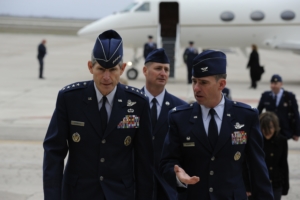Is Stop-Loss a Solution to Keep Air Force Pilots?

By Debbie Gregory.
Pilots are leaving the United States Air Force faster than they can be replaced. Officials are considering the drastic solution of forcing the pilots to stay against their will. Faced with losing pilots to commercial airlines, top generals are considering enacting the stop-loss option.
Stop-Loss is a policy of forcing retaining members, in this case pilots, to stay beyond their original agreed period.
General Carlton Everhart, Chief of Air Mobility Command, and other senior Air Force generals will meet with national airline executives on May 18th to try to find ways to solve this exodus of pilots that will be mutually acceptable by both. The meeting will be at Andrews Air Force Base.
The shortages, especially in fighter pilots, are beginning to hurt the Air Force’s fight against the Islamic State, or ISIS, Everhart said.
But just as important as the shortage of pilots is a dearth of maintenance personnel, said Everhart, whose command oversees the Air Force’s support fleet. This shortage compromises transport, refueling, aeromedical and VIP aircraft. The maintenance shortage has gotten far less attention than the pilot issue, but the Air Force is also beginning to lose other key types of skills to the civilian sector, from air traffic controllers to cyber warriors
“If I don’t have pilots to fly, the enemy has a vote, and if I can’t put warheads on foreheads, then (ISIS) is winning,” Everhart said.
The pilot shortage may be more a function of pilots being pushed out by the declining state of Air Force readiness than about the lure of more money in the private sector.
There are not enough pilots today across all United States military services, especially in the active duty Air Force, the Air National Guard and Air Force Reserve. The remaining staff picks up the slack, resulting in frequent and lengthy deployments, which places additional strains on military families.
At other times, however, pilots are not flying enough. When they return to stateside bases, Air Force pilots spend less and less time in the air. This is partly because the degraded condition of aging fleets of aircraft combined with often insufficient funds for training exercises that have made planes less and less available to fly.
The shortage of maintenance personnel also drives down aircraft availability. To top it off, pilots are increasingly called on to perform administrative tasks, instead of flying, because the Air Force downsized its office staff to save money.
“It’s all connected,” Everhart said.
Military Connection salutes and proudly serves veterans and service members in the Army, Navy, Air Force, Marines, Coast Guard, Guard and Reserve, and their families.

















